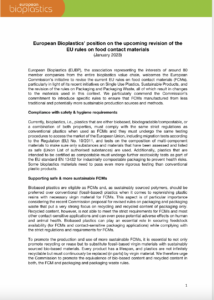 The European Commission is currently revising the EU’s rules on food contact materials (FCMs), particularly in light of its recent initiatives on Single Use Plastics, Sustainable Products, and the revision of the rules on packaging and packaging waste. In order to meet the EU’s ambitious environmental objectives, the Commission should introduce specific rules to ensure that FCMs are manufactured from less traditional and potentially more sustainable production sources and methods.
The European Commission is currently revising the EU’s rules on food contact materials (FCMs), particularly in light of its recent initiatives on Single Use Plastics, Sustainable Products, and the revision of the rules on packaging and packaging waste. In order to meet the EU’s ambitious environmental objectives, the Commission should introduce specific rules to ensure that FCMs are manufactured from less traditional and potentially more sustainable production sources and methods.
Certified bioplastics, plastics that are either biobased, biodegradable/compostable, or a combination of both properties, must comply with the same strict regulations as conventional plastics when used in FCMs and they must undergo the same testing procedures to access the market of the European Union. Some bioplastics materials need to pass even more rigorous testing than conventional plastic products.
To promote the production and use of more sustainable FCMs, it is also essential to substitute fossil-based virgin materials with sustainably sourced biobased materials. Therefore, the Commission should promote the equivalence of biobased content and recycled content in both, the FCM and packaging and packaging waste rules. FCMs made from biobased feedstock help to reduce the need for further extraction of fossil resources, thus, helping to reduce CO2 emissions and contributing to the EU’s ambition to achieve climate neutrality by 2050. Biobased plastics can also be recycled in existing (mechanical, organic when industrial compostable, and chemical) recycling infrastructure.
Certified industrial compostable plastics (packaging and FCMs) can, with reference to the European waste hierarchy, provide added value through organic recycling as an additional waste treatment option. Because organic recycling is a way to implement a circular food cycle in a circular form. While reduction is the priority in the European waste hierarchy, organically recycling food waste clearly becomes a preferred option, also in view of the provision of the Waste Framework Directive. Industrial compostable plastics can help to efficiently manage biowaste by increasing the quantity and quality of separately collected organic kitchen waste. They also help diverting organic waste away from landfills or incineration into organic recycling and reduce the contamination in organic waste collection caused by misthrows of conventional plastics.
Read complete EUBP position on upcoming revision of EU rules on food contact materials here.